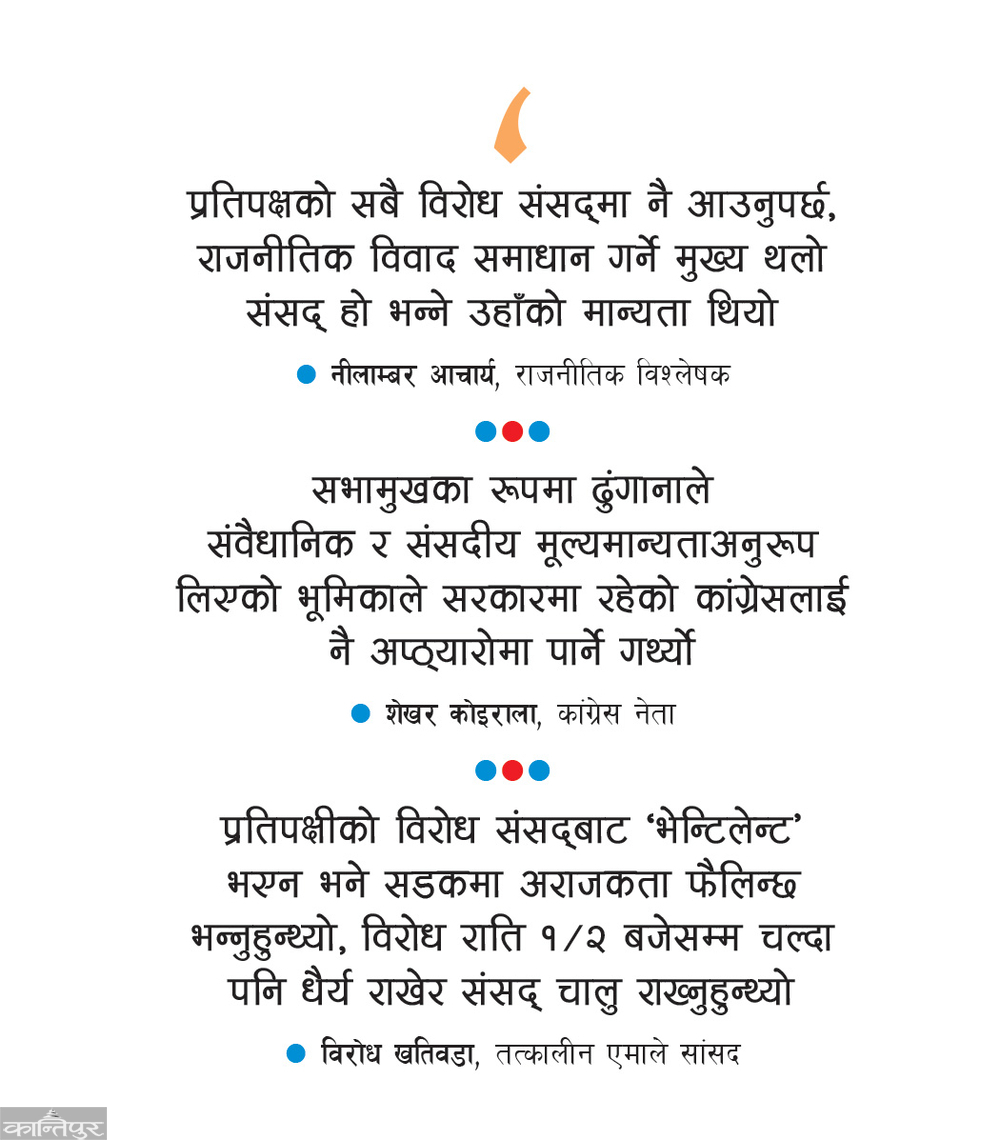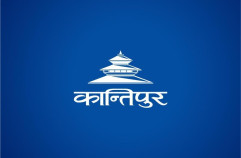Those who did not give place to the 'oppression' of the ruling party, established the belief that the parliament is the opposition

We use Google Cloud Translation Services. Google requires we provide the following disclaimer relating to use of this service:
This service may contain translations powered by Google. Google disclaims all warranties related to the translations, expressed or implied, including any warranties of accuracy, reliability, and any implied warranties of merchantability, fitness for a particular purpose, and noninfringement.
Highlights
- After the restoration of democracy in 2046, Dhungana, the first elected Speaker of the House of Representatives, rose above party interests and performed his role without deviating from parliamentary and constitutional values.
Damannath Dhungana was the speaker who first introduced the principle that "in a parliamentary system, the government belongs to the ruling party, and the parliament belongs to the opposition". When he was Speaker, he rose above party interests and performed his role without deviating from parliamentary and constitutional values. The same former Speaker Dhungana passed away at 1.30 pm on Sunday.

When the constitution was drafted in 2047, Dhungana was a member of the Constitution Drafting Commission under the leadership of the then Chief Justice Vishwanath Upadhyay. In the general election of 2048, he was elected as a member of the House of Representatives from Kathmandu-2 on behalf of the Congress. After that he became the speaker. With the dissolution of the House of Representatives in the year 2051 due to internal strife in the Congress, his post of Speaker was also lost. He contested the election as a member of the House of Representatives twice in 2052 and 2074 but lost in both elections. Even within the Congress party, his position could not be high.
Dhungana, who is also a senior advocate, has been less active in politics but more active in the fields of human rights and peace process after failing to win the general election. From bringing the Maoists in armed conflict to the peace process to issuing the constitution from the Constituent Assembly, he facilitated.
 but the Speaker's tenure is remembered the most. Even now, when the speaker's impartiality is questioned in parliamentary proceedings, some MPs and contemporary leaders give an example to Dhungana's tenure. Contemporaries prefer to call Dhungana an evergreen opposition leader. He did not even take advantage of state power except when he was the speaker. Dhungana used to say about being inactive in the party, 'As much as I have worked for democracy, I have not been able to do as much work for the party.' He played an active role in the movements for the establishment of a democratic system and republic. He was one of the leaders of civil society in the people's movement of 2062/063 for the establishment of the republic.
but the Speaker's tenure is remembered the most. Even now, when the speaker's impartiality is questioned in parliamentary proceedings, some MPs and contemporary leaders give an example to Dhungana's tenure. Contemporaries prefer to call Dhungana an evergreen opposition leader. He did not even take advantage of state power except when he was the speaker. Dhungana used to say about being inactive in the party, 'As much as I have worked for democracy, I have not been able to do as much work for the party.' He played an active role in the movements for the establishment of a democratic system and republic. He was one of the leaders of civil society in the people's movement of 2062/063 for the establishment of the republic.
Nilambar Acharya, a political analyst who has been associated with Dhungana since 2026, said that although he has not been active in politics for a long time, his ideas are still present in Nepali society. He said that he knew him from the beginning as a lawyer with political views. "Even though he was in politics all his life from his student days, he was sometimes a lawyer, sometimes the speaker of the assembly, sometimes he was active for the peace process, human rights, constitution building," Acharya said, "Even as a lawyer, Damanji saw it politically."
Acharya recalled that the then speaker Dhungana believed that all the opposition should come to the parliament. He believed that Parliament is the main place to resolve political disputes. He established the belief that the government should work, the parliament belongs to the opposition," he said. Acharya also told that they had a very close friendship with Dhungana, who read books and shared happiness.
The tussle and tussle between the then speaker Dhungana and the then UML MP Antak Khatiwada in the parliament is still a topic of discussion in the parliamentary arena. He says that Dhungana has made an incomparable contribution towards making the Khatiwada Parliament lively. Around the year 2048, after the Treaty of Tanakpur, UML blocked the Parliament. The situation within the parliament was tense. I was the loudest and loudest from the opposition bench. Then the Speaker protest your name, protest. My name is Daman, Daman said. After that, everyone laughed," Khatiwada remembered the jokes at that time, "he made the parliament in a tense environment comfortable at once."
Khatiwada says that Dhungana has set a new standard in the parliamentary sector by putting into practice the belief that 'Parliament belongs to the opposition and the government belongs to the ruling party'. At that time there was a big 'tussle' between the Congress and the Communists. Girija Prasad Koirala was not loyal to the communists, even though the UML had accepted the multi-party system, he had little faith in democracy. Communist leaders had a good relationship. There was no prejudice against communists. He used to say that only philosophy is different.'
According to Khatiwada, the ruling party expected the speaker to make the government comfortable when the parliament was tense. But he did the exact opposite. He used to say that if the opposition's opposition is not 'ventilated' by the Parliament, chaos will spread on the streets. Even when the opposition's protest lasted until 1/2 in the night, he kept patience and kept the parliament going," he said. "As a result of balancing the parliament, he was punished by the party. Both his access and status within the party were reduced.'
Congress leader Shekhar Koirala remembers that Dhungana's role as Speaker, in accordance with constitutional and parliamentary values, caused embarrassment to Congress which was in government at that time. "Not only when he was in the role of Speaker, but also at other times, he would clearly and fearlessly expose the wrongdoings of Ganeshman Singh, Krishna Prasad Bhattarai and Girija Prasad Koirala," he said, "be it during the active royal rule of the then King Gyanendra Shah or the 12 points between the then 7 political parties and the Maoists. After the agreement, he worked as a contact point for Maoist leaders, why not with Girija Prasad Koirala.'
Dhungana and another human rights leader, Padmaratna Tuladhar, worked together and were good friends. Tuladhar passed away in October 2075. Recently, Koirala feels that Dhungana and Tuladhar acted as communication channels between Maoist Chairman Pushpa Kamal Dahal, who led the armed conflict, and Koirala, who led the street movement. "Daman Dai and Padmaratnaji played a big role in creating an environment of trust in the situation by taking the matter of Maoists to Girija Prasad Koirala and Girija Prasad Koirala to the Maoist leaders," he said, "They even mediated the talks once during the active reign of the king."
83-year-old Dhungana was under treatment for some time due to liver related problems. He rested on Sunday while undergoing treatment at Frontline Hospital in Baneshwar. Dhungana's body has been kept in the mortuary of Trivi Hospital. Dhungana's funeral will be held at Pashupati Aryaghat on Monday, according to the family members.
President Ramchandra Poudel expressing grief over the death of Dhungana said that Dhungana's contribution to the parliamentary and constitutional history of Nepal was unique. He also mentioned that he will remember Dhungana as a politician, senior advocate and civic leader. Prime Minister KP Sharma Oli has mentioned that he is very saddened by the news of the death of the first Speaker of the House of Representatives elected after the restoration of democracy in 2046. "I am remembering his contribution in the promotion of human rights protection movement and parliamentary practice in Nepal," said Prime Minister Oli.
Congress President Sher Bahadur Deuba remembered Dhungana's contribution in the field of democracy, human rights and justice. Speaker Devraj Ghimire has remembered Dhungana as a leader of Nepal's democratic movement, a connoisseur of parliamentary practices and an important person in the peace process. Speaker Ghimire has mentioned that he has contributed significantly to the institutionalization of Nepal's parliamentary practice. Deputy Speaker Indira Rana said that Dhungana will be remembered forever as a speaker who plays a role impartially in matters of parliamentary values and recognition.
 प्रकाशित : मंसिर ३, २०८१ ०५:४६
प्रकाशित : मंसिर ३, २०८१ ०५:४६

















